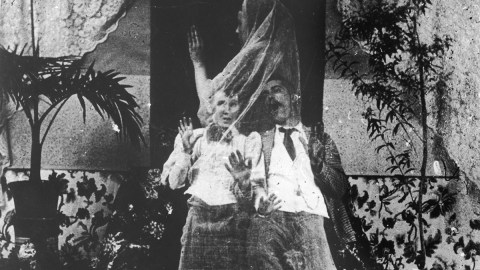Why Do Humans Still Believe in Souls?

Trying to understand our inner condition by noticing patterns in nature is nothing new. Even before Hippocrates designated his four humors, Greek, Roman, and Indian doctors speculated on what various “flows” of different liquids signified. Flow was generally considered beneficial while blockages often led to chronic ailments and even death.
What was invisible could never be understood, so the theory went. Germ theory eventually disproved that notion, but in its wake the idea of a soul has persisted: an ethereal, mysterious, and ultimately unexplainable “other” that is somehow embedded within our biological processes while still existing outside of them.
To follow this train of thought, since inner and outer worlds exist in a synchronous relationship, external actions must hold sway over inner processes, like disease. We witness this type of thinking broadly when, for example, preachers claim earthquakes, droughts, and storms are caused by federal endorsement of same-sex marriage. Just last week Alabama congressman Mo Brooks stated people who “lead good lives” are healthy and therefore should contribute less to insurance pools. There’s a touch of metaphysics in such an ambiguously stated belief.
Few clergymen contemplated this relationship of inner and outer as much as Martin Luther, the subject of an excellent new biography by Oxford University scholar Lyndal Roper. In fact, Luther’s presence in the modern world is owed to his criticism of the Church selling indulgences to Christians to guarantee safe passage in the afterworld. Though Luther became an unlikely champion of the body, his ideas about the soul influenced him throughout his life.
Luther today would likely be a Twitter junkie. After his 95 Theses afforded him widespread renown and kicked off the Reformation in 1517, his fierce rebuttals to policies like idolatry, marriage, and the sacrament ultimately split the religion. He was addicted to text, declaring scripture more pertinent than papal decrees or theologians. He used writing like a masterful marketer. As Roper writes,
He knew exactly how to forestall censorship and protect his ideas by spreading them as widely as possible, each new work marking yet another radical advance to an audience that was hungry for more…. No one had previously used print to such devastating effect.
Moreover, Luther was a champion of the human body. He demanded that wine be served alongside bread for the Christian to truly receive Christ’s blessing (though he conceded that bread alone did the trick in a pinch). When he decided marriage was kosher for clergy (and even married himself) he found sex to be a good thing indeed, even if he still held archaic views about the role of females in society.
And yet, choosing text instead of a living religion—in one of his greatest criticisms aimed at Rome, Luther declared papal power is not biblically sanctioned—Luther lived fully in his imagination, dreaming up what could have been meant all those centuries before by the biblical authors. He was an originalist to a fault, dismissing modern advances in lieu of studied speculation.
He also enjoyed the pleasures of flesh: sex and inebriation became part of everyday life. Still, he ascribed spiritual reasons for what goes on inside of the flesh he loved so much, especially as it relates to disease. Sickness was a sign to be read like tea leaves, especially as it pertained to his own life. As Roper writes,
What was unusual about Luther, however, was that he also sought to derive spiritual certainty from his bodily experiences, and this became increasingly so the older and sicker he became.
He believed his body became, to borrow a Norse term, Ragnarök, where the ultimate forces of good and evil battled inside of his intestines and head for control. The Devil, he wrote in a letter to Lutheran reformer Philip Melanchthon, had quit tempting him spiritually and moved on to physical assaults. His body shutting down was a certain sign that the Antichrist was winning.
As his body failed “his mood became increasingly apocalyptic.” Since his organs were not operating properly that must mean society itself was in disarray. The reformer was not without arrogance—the religious plea of humility seems absent in his pointed directives. Even still, humor remained an integral delivery mechanism, which he used to “destroy the papal aura of holiness.” What emerges is a picture of a man who took no issue in knocking others down to size so long as it was known that his own trimming had cosmic consequences.
In the five hundred years since the Reformation we’re experiencing another revolution in understanding how our nervous systems interact with our environment thanks to the expanding field of neuroscience. Impatient animals we are, some expect that all questions regarding biology not already answered must not exist, leaving the possibility of a ghost inside the machine wide open. Cognitive science is a relatively young discipline, however, and the progress made with the means at hand is already astounding.
While the mechanisms of consciousness are not fully understood, one thing researchers agree on is that consciousness is body dependent. No body, no mind, and therefore not even a conception of a soul. It might be, as Daniel Dennett and others suggest, that consciousness is not created by a singular system in the brain or body, but rather is emergent: it arises from a series of small processes joining together in a unique fashion to create a larger phenomenon. This is born out in the numerous neurological diseases humans suffer, in which one link in the chain being thrown off creates its own unique circumstances.
Whether or not the entire chain will be discovered is unknown. Yet explaining consciousness and feeling consciousness are separate phenomena, just as the way your brain contemplates itself is not a purely rational endeavor but unfolds over time through a series of physical sensations and intuitions.
Martin Luther probably never dreamed people would still be debating topics he put forward in and near Saxony five hundred years ago. While his rebellious nature is to be admired, we’d do well letting go of his fixation of the soul. His revolution began because he understood that paying for eternal passage was ultimately rewarding the collectors. So too today we know that the feeling of a spirit and the biological reality of one are separate and incompatible. Pretending otherwise forces us to stare at the shadow on the wall instead of turning to see the source of the light. If we’re going to keep marching for science, there’s only one direction to head.
—
Derek’s next book, Whole Motion: Training Your Brain and Body For Optimal Health, will be published on 7/4/17 by Carrel/Skyhorse Publishing. He is based in Los Angeles. Stay in touch on Facebook and Twitter.





